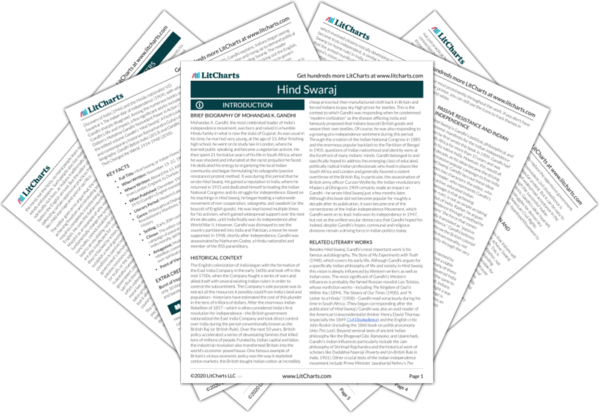Modern civilization Quotes in Hind Swaraj
I do not know why Hind Swaraj has been seized in India. To me, the seizure constitutes further condemnation of the civilisation represented by the British Government. There is in the book not a trace of approval of violence in any shape or form. The methods of the British Government are, undoubtedly, severely condemned. To do otherwise would be for me to be a traitor to Truth, to India, and to the Empire to which I own allegiance.

Unlock explanations and citation info for this and every other Hind Swaraj quote.
Plus so much more...
Get LitCharts A+You have well drawn the picture. In effect it means this: that we want English rule without the Englishman. You want the tiger's nature, but not the tiger; that is to say, you would make India English, and, when it becomes English, it will be called not Hindustan but Englistan. This is not the Swaraj that I want.
Let us first consider what state of things is described by the word “civilisation.” Its true test lies in the fact that people living in it make bodily welfare the object of life.
It has been stated that, as men progress, they shall be able to travel in airships and reach any part of the world in a few hours. Men will not need the use of their hands and feet. They will press a button and they will have their clothing by their side. They will press another button and they will have their newspaper. A third, and a motorcar will be in waiting for them. They will have a variety of delicately dished-up food. Everything will be done by machinery.
Religion is dear to me, and my first complaint is that India is becoming irreligious. Here I am not thinking of the Hindu, the Mahomedan, or the Zoroastrian religion, but of that religion which underlies all religions. We are turning away from God. […] Hinduism, Islamism, Zoroastrianism, Christianity and all other religions teach that we should remain passive about worldly pursuits and active about godly pursuits, that we should set a limit to our worldly ambition, and that our religious ambition should be illimitable.
Civilisation is that mode of conduct which points out to man the path of duty. Performance of duty and observance of morality are convertible terms. To observe morality is to attain mastery over our mind and our passions. So doing, we know ourselves. The Gujarati equivalent for civilisation means “good conduct.”
A nation with a constitution like this is fitter to teach others than to learn from others. This nation had courts, lawyers and doctors, but they were all within bounds. Everybody knew that these professions were not particularly superior; moreover, these vakils and vaids did not rob people; they were considered people's dependants, not their masters. Justice was tolerably fair. The ordinary rule was to avoid courts. There were no touts to lure people into them. This evil, too, was noticeable only in and around capitals. The common people lived independently, and followed their agricultural occupation. They enjoyed true Home Rule.
1. Real home-rule is self-rule or self-control.
2. The way to it is passive resistance: that is soul-force or love-force.
3. In order to exert this force, Swadeshi in every sense is necessary.
4. What we want to do should be done, not because we object to the English or that we want to retaliate, but because it is our duty to do so. Thus, supposing that the English remove the salt-tax, restore our money, give the highest posts to Indians, withdraw the English troops, we shall certainly not use their machine-made goods, nor use the English language, nor many of their industries. It is worth noting that these things are, in their nature, harmful; hence we do not want them. I bear no enmity towards the English, but I do towards their civilisation.












